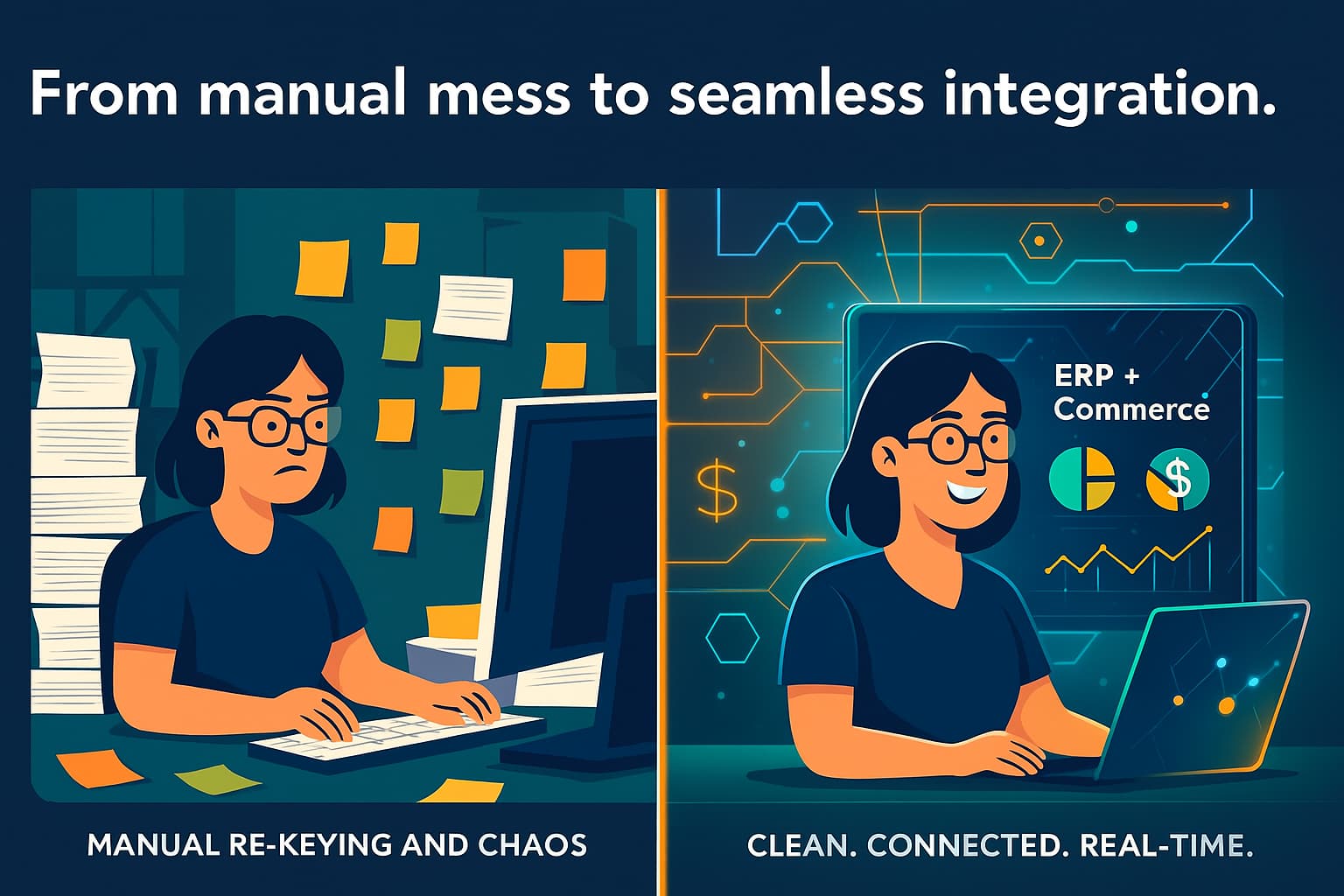

It’s a well-known fact that the ecommerce industry has been flourishing for years. Once the pandemic hit, online sales increased even more. Online businesses relying on an ecommerce platform and a separate enterprise resource planning (ERP) solution have been able to handle the influx of sales.
Unfortunately, without effective integration between both platforms, employees are forced to manually transfer data from the ecommerce marketplace to the ERP solution – a tedious process that costs time, labor, and money.
Integrating the two solutions—an ecommerce-ERP integration—is the best way to address this significant challenge.

An ERP marketplace integration begins with understanding the intention behind the project. Manually transferring data between two solutions is also fraught with human error and data duplication. Not to mention it takes employees away from other growth-enhancing tasks. To succeed in today’s digital economy, ecommerce businesses need to connect the two solutions.
How do you integrate ecommerce with ERP?
Set clear goals. First, determine what data needs to pass automatically between ecommerce marketplaces and the ERP solution. For example, automatic synchronization of orders, inventory, pick-pack-ship processes, returns, customer support, and accounting details will eliminate manual interventions.
The next step is figuring out integration requirements and how the solution will work. Next, establish what metrics need to be improved: Increased sales? Improved customer service? The answers to how a proper integration can help are found through collaboration with ERP partners like Kensium. Their ERP integration expertise is an invaluable asset for customizing ecommerce-ERP solutions to fit specific business needs.

The right ERP solution may work directly “out of the box,” as well as be versatile and customizable to the ecommerce platform. Every business has unique requirements, and software must be adjusted accordingly.
The benefits of customizing ERP solutions are well documented:
- Utilizes a single version of the truth (updated, accurate information) through a single database.
- Gains insights and visibility into the whole organization.
- Efficiently processes customer orders across all shopping channels (omnichannel commerce).
- Streamlines returns and exchanges.
- Eliminates redundant data and duplicate entries.
- Maintains optimum inventory levels.
- Improves customer service with access to customer/order data in one place.

These capabilities add to increased profitability for commerce businesses that undergo an ecommerce-ERP integration.
Though an ERP marketplace integration is in the best interest of ecommerce businesses across the board, there are pitfalls to customizing ERP systems. For one, employees are not always amenable to change. Working with a new solution and new processes may produce pushback.
From the beginning, communicating all plans for an ecommerce-ERP integration to all departments is critical. Then, when the plan is implemented, provide training and support until every employee knows how to use the solution to its full potential.
Another pitfall is not planning for future needs. Customizing the ERP integration for the here and now makes sense…until unexpected challenges arise. Finally, make sure the commerce and ERP solutions you choose are future-proof. Integrated, future-proof solutions allow businesses to adapt to changing circumstances as they occur.

Having a clear vision and using all possible resources are the key steps to successful ecommerce-ERP integration. First, choose an ERP partner that provides its commerce software and can easily and seamlessly integrate with most ecommerce marketplace.
What Is The Best Solution To ERP Integration?
Acumatica Cloud ERP is that solution. It is mobile, affordable, cloud-based, and built to transform companies in the digital economy. Acumatica allows commerce businesses to easily integrate with its cloud ERP software and essential third-party applications based on a flexible platform with open architecture.
All sale points (online, telesales, and physical stores) connect with accounting, sales, inventory, fulfillment, and more—providing automation capabilities and access to real-time information from any location, at any time.
As an end-to-end eCommerce solutions provider and Acumatica Gold Partner, Kensium is dedicated to simplifying digital commerce by offering guidance, technology, and support best suited for long-term success. We believe Acumatica Cloud ERP is a solution perfectly tuned to any commerce business looking for success. To learn more, contact our experts today.








.png)


















































-small.jpeg)






